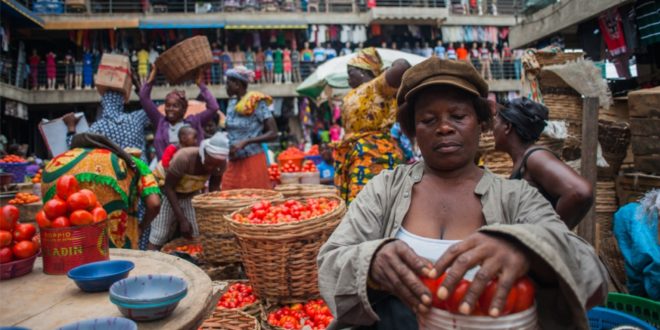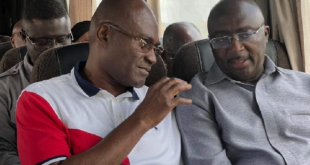Ghana’s year-on-year inflation dropped to 40.1% in August after ramping up for four consecutive months.
Inflation in Ghana is on an irregular trajectory – four months of continuous decline followed by three months of protracted rise. After peaking in December 2022 accompanied by a relatively stable rate in January and February, many experts projected a persistent drop in price level for the subsequent months.
The picture appears to be different as supply constraints coupled with a high cost of production compels inflation to head north in July 2023 before a decline in August.
40.1% year-on-year inflation rate is still high and the Ghana Statistical Service says this was heavily influenced by food and non-alcoholic beverages accounting for 42.7% of the division. The next brackets that came close to food were transport and utilities (including housing and other fuel) with corresponding shares of 10.5% and 10.2% respectively.
At the month-on-month level, inflation in August dropped the highest by recording a deflation of 0.2% compared to 3.6% in July 2023.
Although headline inflation has experienced a significant decline, food inflation still remains above 51%. In fact, Ghana’s food inflation has increased by almost six folds in a decade and despite receiving fresh funding from the International Monetary Fund (IMF), it continues to grapple with persistently high food inflation, maintaining its position as one of the highest in Africa and the West African sub-region.
The IMF’s financial assistance is expected to provide a boost to Ghana’s economy, but the lingering issue of soaring food prices raises concerns about the effectiveness of the measures implemented and highlights the underlying challenges the country faces.
Food inflation in August though above 50% experienced a sharp decline after dropping by some 3 percentage points relative to July 2023. However, Ghana’s high level of food prices is deeply rooted in some fundamental challenges existing in the agriculture sector.
The sector faces numerous structural challenges that hinder its productivity and growth. Limited access to credit, inadequate infrastructure, outdated farming practices, and inconsistent government policies have all hampered the sector’s ability to meet rising food demands efficiently.
After rolling out the Planting for Food and Jobs flagship programme in 2017, government has gone ahead to spend an average of $70 million annually to see this programme running.
Almost six years after implementing this programme, food inflation has worsened – moving from 7.2% in April 2017 to 51.9%, ballooning by more than seven times. Phase two of the programme has been rolled out and is expected to boost production.
In the last four months, the Ghana cedis has gained some stability against the US dollar, yet the previous prolonged depreciation stint has exacerbated inflation by increasing the cost of imports. Ghana’s reliance on imported goods, including essential commodities like food, makes it particularly susceptible to currency fluctuations.
As a result of this, a slight depreciation of the Ghanaian cedi heavily drives up the prices of essential goods, further burdening consumers. Experts have argued that Ghana’s economic woes particularly the continuous depreciation of the Ghana cedi and high rate of inflation will be a thing of the past should the nationals shift from patronizing imported products and services to producing and using Made in Ghana.
Ghana’s Finance Minister, Ken Ofori-Atta disclosed in the 2023 budget statement that on average, Ghana’s import bill exceeds US$10 billion annually and is accounted for by a diverse range of items that include sugar, rice, fish, poultry, palm oil, cement, fertilizers, pharmaceuticals, Toilet roll, toothpick, fruit juices, amongst others.
Major staples in Ghana are out of season and this is playing a major role in the price build in the market. For example, tomatoes, onions, cassava, yam, and maize amongst others have seen upward adjustments in their prices.
On top of this, Ghana has a double whammy to deal with – the prolonged war between Russia and Ukraine plus the military coupe in Burkina Faso have all placed enormous pressure on Ghana. The military takeover in Niger also compounded the case as prices of tomatoes, onions cereals begin to surge in price.
The Black Star of Africa’s economy is facing significant challenges and may not be able to handle a growth rate as high as 2.8% this year. Despite Finance Minister Ken Ofori-Atta initially stating that there would be no need for a supplementary budget, mounting fiscal pressures have forced him to cut expenditures by approximately $2 billion.
The projected economic downturn in Ghana has led to the revision of key economic indicators. End-period inflation is now expected to reach 31.3%, significantly higher than the earlier projection of 18.9%. Additionally, the balance of payment burden is expected to worsen as Gross International Reserves may only cover about 0.8 months of imports.
THANK YOU for constantly reading stories on MyGhanaMedia.com, a news publishing website from Ghana. Kindly like, follow, comment, and SHARE stories on all social media platforms for more entertaining updates!
Follow us on Twitter: https://twitter.com/
Source: MyGhanaMedia.com
There are four types of content published on MyGhanaMedia.com daily: curated content; syndicated content; user-generated content; and original content.
 MYGHANAMEDIA.COM Best Source Of Latest News
MYGHANAMEDIA.COM Best Source Of Latest News





